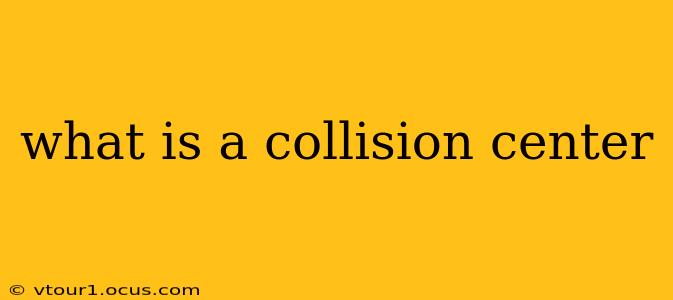A collision center, also known as an auto body repair shop or collision repair facility, is a specialized facility dedicated to repairing vehicles damaged in accidents. These centers go beyond simple dent removal; they handle comprehensive repairs, restoring vehicles to their pre-accident condition, both aesthetically and mechanically. Think of them as the intensive care unit for your car after a fender bender or a more serious collision. This in-depth guide will explore everything you need to know about collision centers.
What Services Do Collision Centers Offer?
Collision centers offer a wide range of services, encompassing nearly every aspect of vehicle repair after an accident. These typically include:
- Damage Assessment: A thorough inspection to identify all damage, both visible and hidden.
- Frame Repair: Correcting damaged frames using specialized equipment to ensure structural integrity.
- Bodywork: Repairing or replacing damaged body panels, including straightening, filling, and painting.
- Mechanical Repair: Fixing any mechanical damage resulting from the collision, such as engine problems or suspension damage.
- Painting: Matching the original vehicle color precisely using advanced paint technology and techniques.
- Parts Replacement: Sourcing and installing original equipment manufacturer (OEM) parts or high-quality aftermarket parts.
- Detailing: Returning the vehicle to a pristine condition, including cleaning, polishing, and vacuuming.
What is the Difference Between a Collision Center and a Regular Mechanic?
While a regular mechanic handles routine maintenance and repairs, a collision center specializes in accident-related damage. Their expertise lies in structural repair, precise bodywork, and color matching – skills not typically found in a standard auto repair shop. They often possess specialized tools and equipment designed for collision repair, such as frame straightening machines and paint mixing systems.
How Do I Choose a Reputable Collision Center?
Selecting the right collision center is crucial to ensuring your vehicle is repaired correctly and safely. Consider these factors:
- Certifications and Accreditations: Look for centers certified by organizations like I-CAR (Inter-Industry Conference on Auto Collision Repair) which demonstrates a commitment to training and quality.
- Customer Reviews: Check online reviews on sites like Google, Yelp, or other review platforms.
- Insurance Company Relationships: Many insurance companies have preferred providers; check with your insurer.
- Transparency and Communication: A reputable center will clearly explain the repair process and keep you informed throughout.
- Warranty: Inquire about the warranty offered on repairs.
What is the Repair Process Like at a Collision Center?
The process typically involves:
- Initial Assessment: The center inspects the damage and provides an estimate.
- Insurance Claim: You file a claim with your insurance company.
- Repairs: The center performs the necessary repairs.
- Quality Control: The repairs are inspected to ensure they meet standards.
- Vehicle Return: Once approved, you get your vehicle back.
What Should I Do After a Car Accident?
Following an accident, prioritize safety. If anyone is injured, call emergency services. Then:
- Document the Scene: Take photos of the damage, the surrounding area, and any visible injuries.
- Exchange Information: Get the other driver's information, including their license, insurance, and contact details.
- Report the Accident: Contact your insurance company and the police if necessary.
What Types of Insurance Coverage Apply to Collision Repair?
Collision coverage is the type of insurance that pays for repairs to your vehicle if it's damaged in an accident. This typically covers damage to your own car, regardless of who was at fault. Comprehensive coverage may also apply, which covers damage from non-collision events like hail or vandalism. Your policy details will specify the extent of coverage.
By understanding the intricacies of collision centers and the repair process, you can confidently navigate the aftermath of an accident and ensure your vehicle is restored to its pre-accident condition. Remember to choose a reputable center and communicate openly to ensure a smooth and successful repair.
